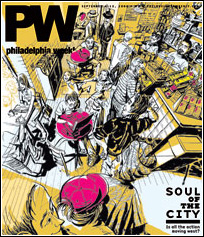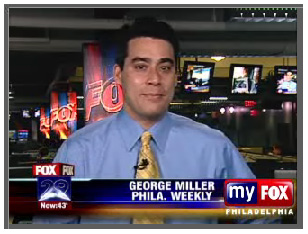Paper Cuts
The Metro brass comes to town and sacks two editorial staffers.
From the January 30, 2008 Philadelphia Weekly
The Swedish corporate brass arrived at the Metro's offices last Thursday and announced layoffs.
The money-losing newspaper company, which was the focus of last week's PW cover story, fired one reporter and a copy editor, along with several members of the marketing team, including the marketing director.
The loss of two editorial staffers isn't exactly earth-shattering news, even when the two were among a small staff of 11. But when you consider the other cutbacks in print journalism announced last week - locally and nationally - you get a grim picture of an industry whose primary intent is supposed to be informing the public.
"You've obviously run smack up against the business realities of journalism," says Phil Beck, president of the Greater Philadelphia chapter of the Society of Professional Journalists. "The problem with that is that ownership doesn't look at journalism as a service. They see it only as a business."
Beck says that like doctors and lawyers, journalists are professionals who exist to serve the citizens. Their role in society is to investigate the people who make decisions in your name, to report on the actions that impact you and to document the world's constant changes.
"Journalists are supposed to look out for the interests of citizens," Beck says.
That job, he notes, is becoming harder and harder to do.
***
The Metro corporate honchos arrived here after sacking staffers at their New York and Boston outlets, including the publishers of both papers and the U.S. editor-in-chief. Including the cuts in Philly, 27 people lost their positions so that Metro International can save half a million dollars during the first quarter of 2008 and about $4.6 million for the year.
Last week Brian Tierney, CEO of Philadelphia Media Holdings, told Inquirer and Daily News union officials that the company needed to cut costs by 10 percent. He allegedly threatened layoffs and overseas outsourcing rather than allow his investors to lose money. Neither Tierney nor his spokesperson returned numerous calls for comment.
This latest scare arrived one year after 68 Inquirer staffers were laid off due to poor business performance. The Inquirer and Daily News had previously reduced editorial staffs by 100 people in 2005.
"There are a lot of things going on that people don't know about because there's no one at the newspapers to cover it," says Denise Clay, a past president of the Philadelphia Association of Black Journalists.
The only time the media arrive in some neighborhoods in Philadelphia is when bad things happen - fires, murders, rapes, robberies, etc. The community gatherings, planning meetings and festivals rarely get coverage anymore, Clay says.
"If you get shot, a reporter will be there," she says. "That's it. It shouldn't be that way."
She argues that the lack of neighborhood coverage only turns away readers who feel disconnected from the information that's published.
"If all you read about your neighborhood is the shootings, the fires and the robberies, you're not going to pick up the paper," Clay says. "It doesn't speak to what's really going on in your world."
***
The Calkins Media Group, publishers of the Burlington County Times, Bucks County Courier Times, Doylestown Intelligencer and several other papers, laid off several employees last week. The Chicago Sun-Times announced that 20 percent of its newsroom would be eliminated. Hundreds of people are rumored to be on the chopping block at the Boston Globe, the Boston Metro reported.
At the Philly Metro, they're already dealing with losses. Fired copy editor Jody McClain has 18 years of experience in journalism. Reporter Mike Benner is a Temple graduate (and former PW intern and freelance writer) who covered politics and education during his year at the Metro.
"It hurts a lot to lose talented people," says Metro editor Ron Varrial. "But we're sure as hell not alone."
The Metro's reductions may have just been a way of making the three Metro papers more financially attractive to potential buyers. Some editorial functions will be centralized in the New York office, a practice that was a source of angst for Philly staffers in the past.
One Metro staffer now describes the Metro office as a gulag. Another staffer emailed a simple summation of the Metro's situation: "Fucking corporation."








